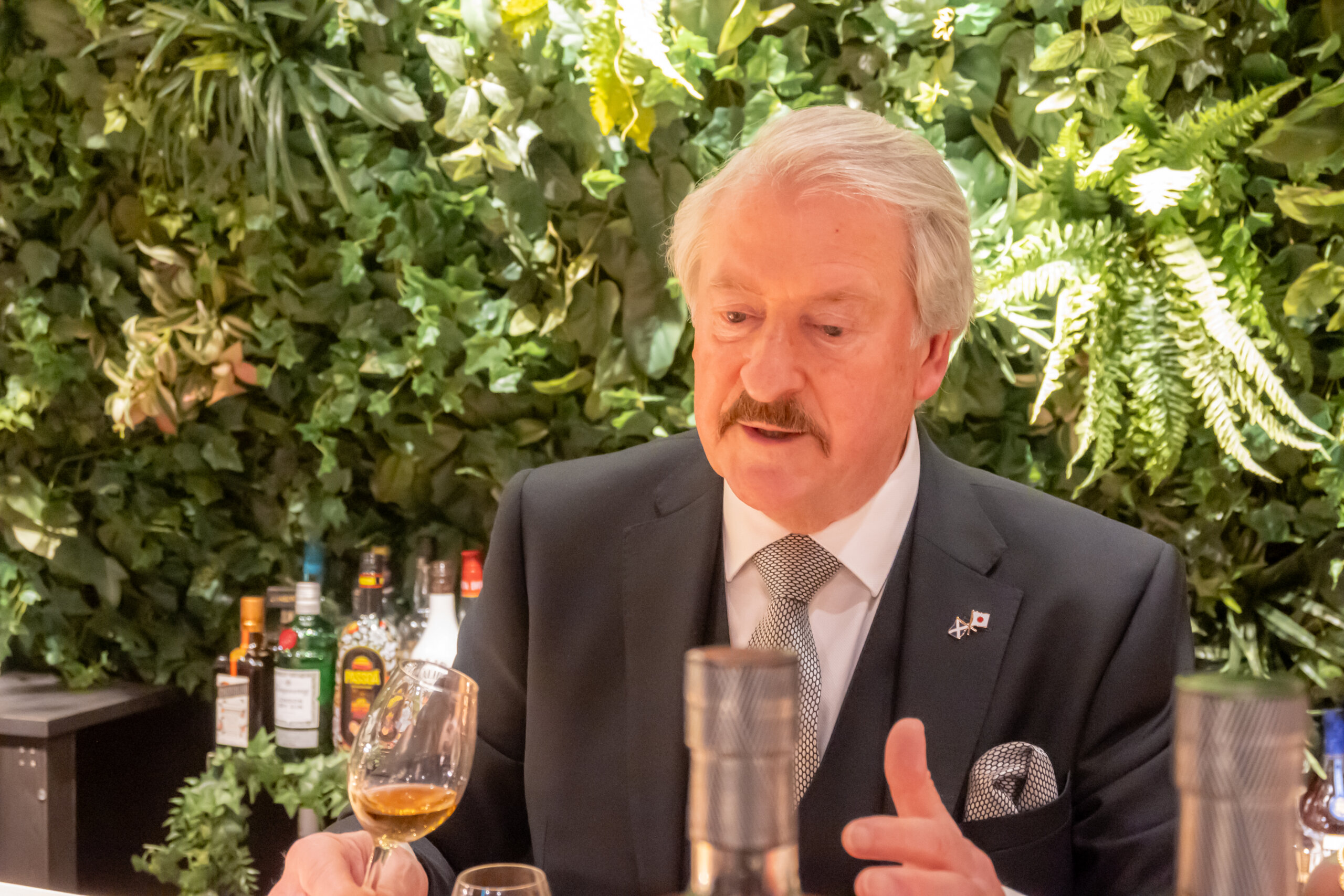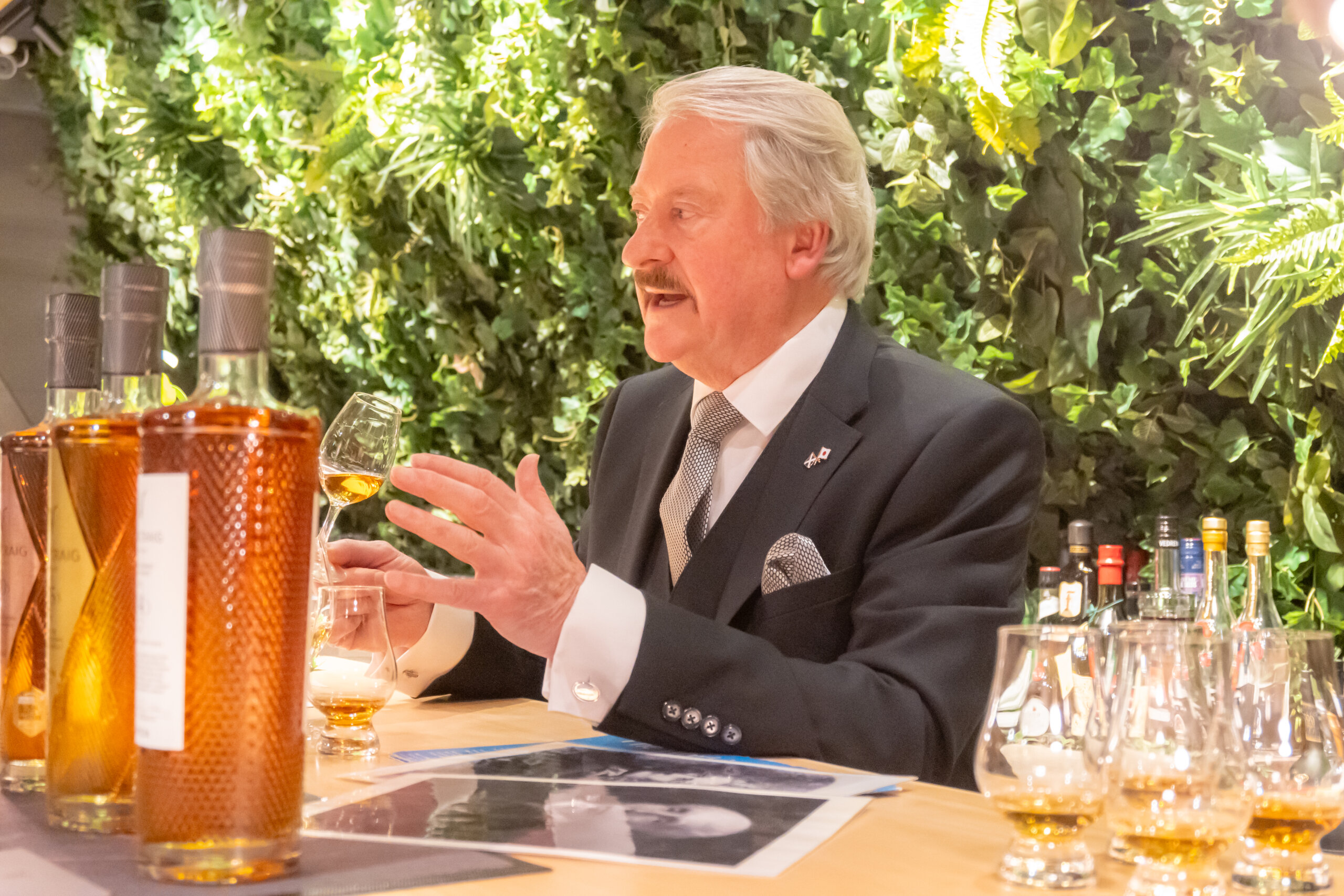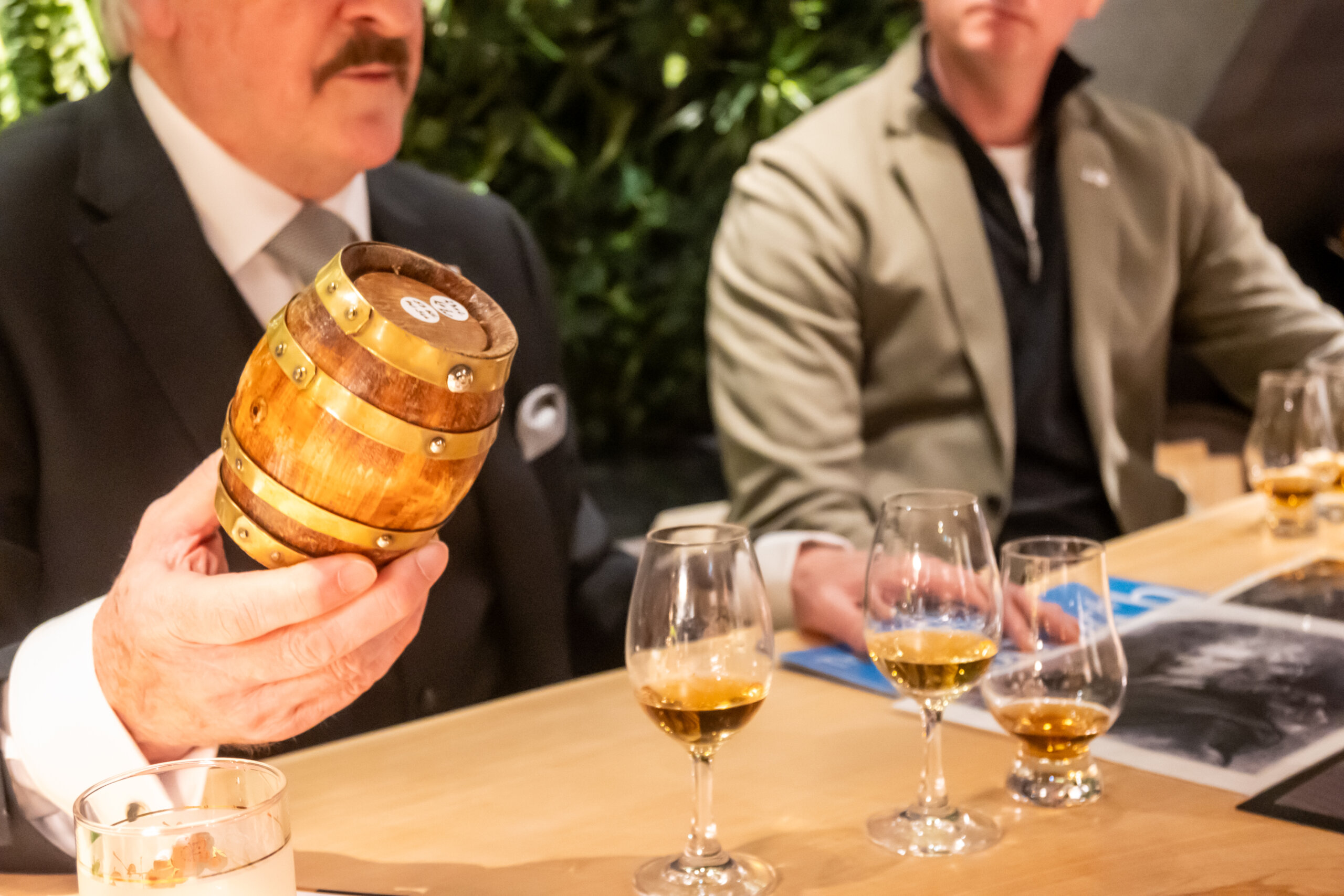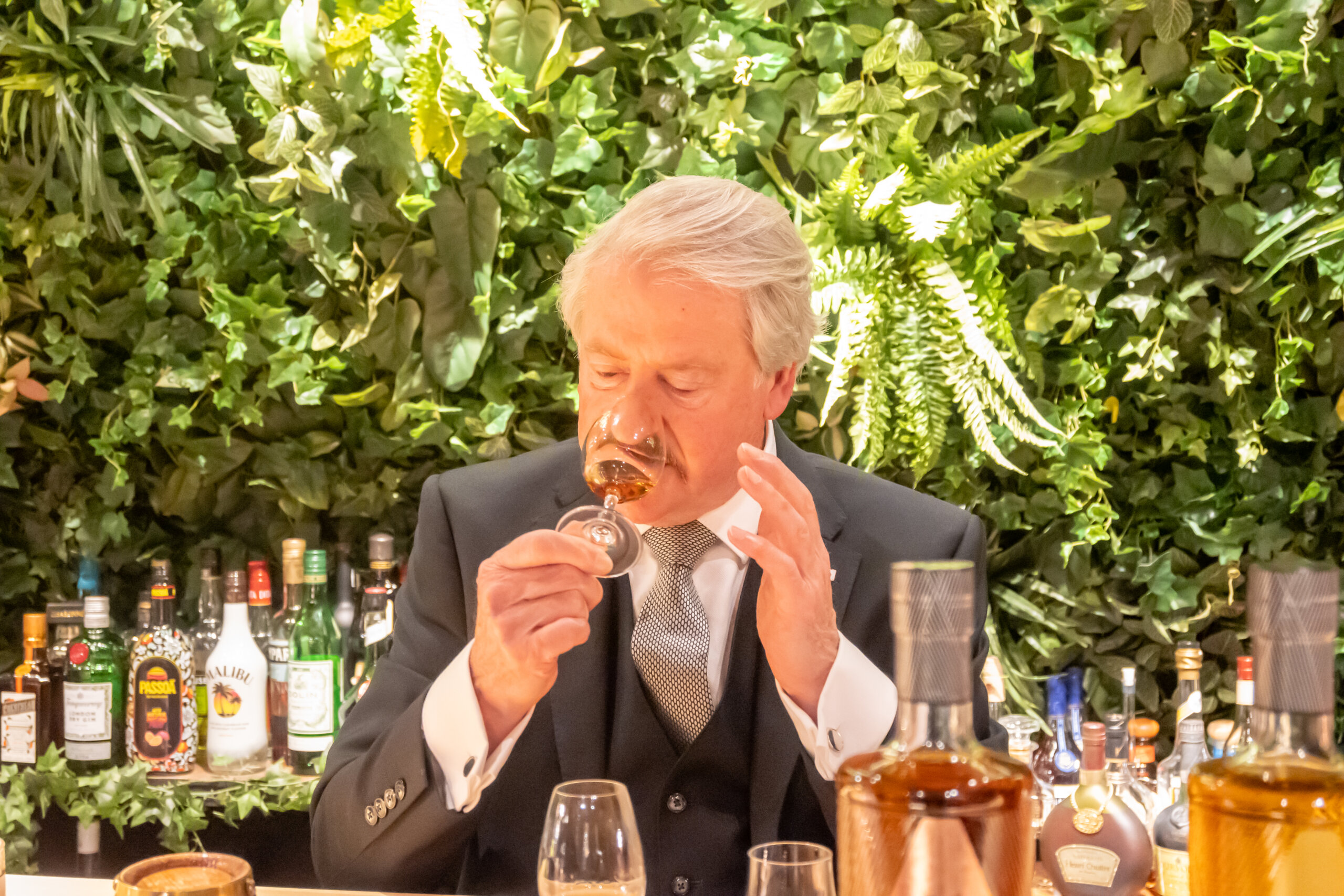
【Exclusive Interview】Calum Rae-Holyrood Distillery
- 造り手
- 蒸溜所(海外)

「偉大な鼻(The Nose)」の異名で知られるリチャード・パターソン(Richard Paterson)さんはウイスキー業界で50年以上の経験を持ち、ウイスキー業界において強い影響力のある、最も著名な人物の1人です。
半世紀近くホワイト&マッカイ社(Whyte & Mackay)のマスターブレンダーを務めたのち、現在はダルモア蒸溜所(The Dalmore)のマスターディスティラーや、最近ではウルフクレイグ・ディスティラーズ(Wolfcraig Distillers)のマスターブレンダーも務めています!
ウルフクレイグは、元ホワイト&マッカイ社CEOの故マイケル・ランさんとその息子のジェイミー・ランさんによって2020年10月に設立された、新しいウイスキーブランドです。
2020年にウルフクレイグのマスターブレンダーに就任したパターソンさんは、ブラドノック蒸溜所の元マスターブレンダーで、ディーンストン、ブナハーブン、トバモリー蒸溜所でも働いていたイアン・マクミランさんと共同で、マスターブレンダーとなりました。
以前から親交の深かった2人ですが、同じ蒸溜所で共にマスターブレンダーを務めるのは初めてのご経験だそうです!
パターソンさんがマスターブレンダーとして新たな道を歩むこの重要な転換点に、パターソンさんへインタビューをさせていただきました!ウイスキー業界に長く身を置いているパターソンさんだからこそ話せる豊かな経験や、ウイスキーに懸ける想いをお聞きすることが出来たので、是非最後までご覧ください!
(撮影:Bar Five Arrows)
1949年、パターソンさんはウイスキー事業を営む家庭に生まれました。お父様も、お祖父様も、もマスターブレンダーであり、また高祖父にあたるのはイングランド銀行の創業者であるウィリアム・パターソンです。
1966年、17歳でウイスキー業界に飛び込んだパターソンさんは、1970年にはホワイト&マッカイ社に入社、1975年、26歳の時に若くしてマスターブレンダーとなり、2020年に定年退職するまでの50年間にわたってホワイト&マッカイ社に在籍していました。
Dear WHISKY:
ご家族はウイスキー事業でどのような仕事をされていたのですか?
パターソンさん:
私の父も祖父もマスターブレンダーでした。そんな2人を見て育ったので、自然と私もその背中を追いかけるようになりました。
Dear WHISKY:
パターソンさんのウイスキーとの出会いはどういったものだったのでしょうか?
パターソンさん:
8歳の時に、父の会社が所有していたウイスキーの熟成庫に連れて行ってもらいました。そこで私にウイスキーの熟成やブレンディングについて教えたかったそうなのですが、まだ幼かった私が興味を持つはずもなく、熟成庫の中で遊び回っていました。
Dear WHISKY:
それを見たお父様はどのような反応をされたのですか?
パターソンさん:
父からウイスキーグラスを手渡されたのですが、私がおかしな持ち方をしていたので父を怒らせてしまいました。父はグラスに入ったウイスキーを回し、私に「ウイスキーに語りかけなさい」と言いました。
父は私にウイスキーの香りを嗅がせ、「怒りっぽいおじいちゃんにように重たいか、優しいお母さんのように軽いか、チョコレートのように甘いか、床の埃のように乾いているか」と聞いてきました。この父のアドバイスが、ウイスキーの香りを楽しむためのヒントを私に与えたのです。
Dear WHISKY:
そのアドバイスを受けた後、ウイスキーにどのような香りや味わいを見出しましたか?
パターソンさん:
重厚でコクがあり、甘味があるように感じました。その独特の味わいがシェリー樽に由来していることをのちに知りました。
この経験が原体験となり、この業界に関わりたいと強く思いました。こうして60年近く経った今でも、あの時と同じ情熱でこの業界に携わっています。

ウイスキーとの出会いを語るパターソンさん
Dear WHISKY:
パターソンさんはお父様からウイスキーに関する教育を受けられましたか?
パターソンさん:
ええ、父は様々なウイスキーの種類やその産地について教えてくれました。ただ正直に言うとまだ若かった頃の私はあまり気に留めていませんでした。この業界に入って、ウイスキーに関する本を書くようになってから、もっと父に色々訊けばよかったと思いました。
Dear WHISKY:
当時あまり真剣に学ぶ気がしなかったのはなぜでしょうか?
パターソンさん:
子というのは父親にああだこうだと言われたくなくて、反発してしまうものです。自ら色んなことを学びたがるし、それですべてを知った気になってしまうのです。今となっては若い時にもっと父と話しておけばよかったと後悔しています。
Dear WHISKY:
お父様と一緒に初めて飲んだウイスキーは何でしたか?
パターソンさん:
「パターソンズ・ベスト(Paterson’s Best)」という父が造ったウイスキーです。これはモルトとグレーンを使用したブレンデッド・ウイスキーで、当時父は様々な形のボトルに瓶詰めしたと言っていました。例えば、このボトルは「ブックボトル」と呼ばれるもので、本の形をしているボトルで、今でも大切に持っています。
Dear WHISKY:
パターソンさんはお父様が造ったウイスキーでテイスティングの仕方を学ばれたのですか?
パターソンさん:
そうですね。父が自分で作ったウイスキーであったからこそ、その香りや味わいを楽しむ方法を熟知していて、私に教えてくれたんです。

パターソンさんのお父さんとお爺さんの写真。手枚の写真の窓際に写っているのが「パターソンズベスト」。
Dear WHISKY:
ホワイト&マッカイ社に入られる前はどのような仕事をされていたのですか?
パターソンさん:
1966年にキャンベルタウンでウイスキー造りをしていた 「A.ギリーズ&カンパニー・ウイスキーブレンダーズ&ブローカーズ(A. Gillies & Company Whisky Blenders & Brokers)」という会社でウイスキー業界のキャリアを始めました。
Dear WHISKY:
その当時何か困難や試練に感じることはありましたか?
パターソンさん:
親の七光りでこの仕事に就けたのだと思われたくなかったため、ウイスキーだけでなく、コニャックやワインについても一生懸命学びました。
知は力なりというように、たくさん勉強し知識をつけることで、父から自立していることを証明しようと思い、一歩ずつ行動に移していきました。
Dear WHISKY:
ご自身が入社した1979年当時、ホワイト&マッカイはどのような会社でしたか?
パターソンさん:
当時のホワイト&マッカイは今ほど大きな会社ではなく、非常に革新的で闘争心のある企業でした。
知名度のあるブランドではなかったものの、自分たちのブレンデッドウイスキーが、人気のある他のウイスキーたちに勝るとも劣らないクオリティであることを証明しようと燃えていました。
Dear WHISKY:
ホワイト&マッカイのどの点に魅力を感じて入社したのですか?
パターソンさん:
その革新的な雰囲気に加え、まだ小さな会社だったので、ここでならより多くのことをより早く学ぶことが出来るのではないかと考えて、入社することに決めました。
Dear WHISKY:
26歳という若さでマスターブレンダーに就任するまでに、どのように知識や経験を培っていったのでしょうか?
パターソンさん:
ホワイト&マッカイで働き始めた頃、社内のさまざまな部署と関わらせてもらいました。ブレンディングだけでなく、瓶詰めや輸出についても学びましたし、熟成庫に行けばウイスキーに関するあらゆる側面を見ることが出来たので、有意義な日々を過ごすことが出来ました。
Dear WHISKY:
ウイスキー業界に入った当時からブレンダーになりたいという想いはありましたか?
パターソンさん:
そうですね。幼少の頃、父の熟成庫でウイスキーに出会った時からずっとブレンダーになりたいと思っていましたし、同じくブレンダーであった父の後を追いたいと考えていました。
Dear WHISKY:
そのご経験が今の仕事に対する姿勢に何か影響を与えたのでしょうか?
パターソンさん:
非常に几帳面な性格だった父は、いつも自分の製品に完璧さを求めていました。
その妥協を許さない姿勢に影響されて、私も常に完璧さを追い求めて仕事をしています。
Dear WHISKY:
当時、マスターブレンダーに就任された1970年代、ウイスキー業界はどのような状況でしたか?
パターソンさん:
1970年代当時は、シングルモルト・ウイスキーが人気の今とは異なりブレンデッド・ウイスキーが主流でした。実はシングルモルト・ウイスキーが市場に登場するのは1990年代後半になってからなのです。
そんなブレンデッド・ウイスキーが主流の時代において、マスターブレンダーは会社の花形ともいえる役職でした。
Dear WHISKY:
パターソンさんがマスターブレンダーとして大切にされていることはありますか?
パターソンさん:
私がマスターブレンダーになってからは、特に製品の品質に責任を持つようになりました。ミスをしないことや、自分のスタイルを確立させることも勿論大切ですが、何よりも安定した品質を維持することが重要です。
世界のどこでウイスキーを飲んでも、常に同じ品質のものを提供できるようにするのが、マスターブレンダーの重要な仕事の一つです。

自身のキャリアについて語るパターソンさん。
Dear WHISKY:
パターソンさんが考えるウイスキー業界にとっての転換点となる出来事はありましたか?
パターソンさん:
一つ挙げるとするならば、1997年にフランクフルトで開催されたウイスキーフェスティバルだと思います。それ以来、東京も含め、世界各地でウイスキーフェスティバルが開催されるようになって、多くの人がウイスキーに関心を持つようになったと思います。
Dear WHISKY:
そういったフェスティバルはウイスキー業界にどのように影響したと思いますか?
パターソンさん:
ウイスキーフェスティバルでは、スコッチウイスキーだけでなく、バーボンウイスキーやジャパニーズウイスキーなど、さまざまなウイスキーが紹介されます。
ウイスキーをより広く知っていただけるようになりましたし、若い世代がこういったフェスティバルに来て、様々なウイスキーを体験したり学んだりするのは素晴らしいことだと思います。
Dear WHISKY:
日本のウイスキー業界もそういった影響を受けていると感じますか?
パターソンさん:
日本を訪れると多くの若者がおしゃれなウイスキーバーで試飲していて、いつも驚かされます。全ての国がそうではありません。ウイスキーバーというと、年配の方がウイスキーを飲んでいることが多く、日本のように、ウイスキーがどのようなものか知りたいという若者が多くいる国は珍しいと思います。
Dear WHISKY:
ウイスキーフェスティバル以外に1990年代の特徴となることはありましたか?
パターソンさん:
世界各地でフェスティバルが開催されるようになると、ウイスキーのボトルやラベルのデザインが他の酒類と比較されることが多くなりました。当時、私たちはおしゃれで華のあるコニャックのボトルデザインに刺激を受け、それをスコッチウイスキーの世界にも取り入れようとしました。
Dear WHISKY:
当時ホワイト&マッカイではデザインを良くするためにどのような取り組みを行ったのでしょうか?
パターソンさん:
ストーリー性のあるデザインで、ウイスキーを買われるお客様の印象に残るデザインをすることに重きを置いていました。この精神は今のウルフクレイグにおいても受け継がれています。
Dear WHISKY:
理想のウイスキーを造る上で最も大切なことは何ですか?
パターソンさん:
最も重要なのは樽です。
様々な種類の樽がウイスキーに個性を与え、パレットのように機能することでブレンディングやヴァッティングに様々な選択肢を与えてくれるのです。

樽の重要性を説明するパターソンさん。
Dear WHISKY:
スコッチウイスキーと他のウイスキーの違いはどういったところにあるのでしょうか?
パターソンさん:
スコッチウイスキーは気候の異なるさまざまな地域で造られ、それぞれが独自の特徴を持っていますが、これは他の国ではあまり見られない特徴です。
このようにスコッチウイスキーは多種多様な地域があり、異なった性格を持っているため、様々な種類のウイスキーを楽しむことができます。
Dear WHISKY:
ご自身のテイスティングスタイルはどのようにして確立したのですか?
パターソンさん:
名のあるブレンダーで、既に似たテイスティングスタイルを持っていたドナルド・マッキンリー氏に影響を受けました。
Dear WHISKY:
ドナルドさんは具体的に、どのようにウイスキーの試飲をしていたのでしょうか?
パターソンさん:
彼がウイスキーの試飲をするときは、手に持ってそれを振るのですが、彼がウイスキーを振ると、よくカーペットの上に飛び散っていました。
Dear WHISKY:
ご自身のテイスティングスタイルの中で最も重要な部分はどこですか?
パターソンさん:
グラスの中のウイスキーを捨てることです。
グラスの中のウイスキーを勢いよく回し、投げ捨てることで、グラスに付着した余計な匂いを洗い流すのです。
Dear WHISKY:
それが原因でトラブルに巻き込まれたことはありますか?
パターソンさん:
韓国にいた時、同じようにウイスキーを投げ捨てたら、サンドイッチに3万円以上も請求されたことがあります。私が「これは高すぎませんか?」と訊いたら、店員に「これはあなたがウイスキーを捨ててカーペットを汚した分の値段です」と言われてしまいました。
Dear WHISKY:
ウイスキーが捨てられたカーペットにシミが残ったりすることはありますか?
パターソンさん:
シミが残ることはありませんし、実際、私のサンプルルームのカーペットも全く汚れていません。
Dear WHISKY:
他にウイスキーテイスティングで大切にしていることはありますか?
パターソンさん:
マスターブレンダーにとしてウイスキーテイスティングをする上で、コピータと呼ばれるグラスを使用するのが重要です。
正しいテイスティンググラスを用意したうえで、グラスを鼻に近づけ「 ‘Hello’, ‘How are you?’, ‘Quite well’, ‘Thank you very much’ 」とウイスキーに語り掛け、会話をすることが大切になってきます。
Dear WHISKY:
なぜその会話が大切なのでしょうか?
パターソンさん:
例えば人同士、初対面でお互いのことをほとんど知らなくても、会話をかさねることで徐々に相手のことを知っていきますよね?ウイスキーについても同じです。
最初はほとんど知らないそのウイスキーの個性や魅力を会話を通じてゆっくり引き出していくのです。

コピータグラスを用いてウイスキーをノージングするパターソンさん。
パターソンさんのウイスキーテイスティングについてはこちらの記事で詳しく紹介していますので、是非ご覧ください!
Dear WHISKY:
パターソンさんにとってウイスキーはどのような存在ですか?
パターソンさん:
長くこの業界に身を置くと、時々「60年経ってもなぜウイスキーを愛しているのか?」と聞かれます。
実は私が本当に好きなのは、ウイスキーをテイスティングしている人の目に映る輝きです。
私が、ウイスキーの香りや、味わいについて話しているときに、彼らの目を見ると、その人が本当にウイスキーを楽しみ学んでいることが良く伝わってきます。
私たちが造ったウイスキーを楽しんでいる人を見ることに、何よりもやりがいを感じるのです。
Dear WHISKY:
初めて日本を訪れたのはいつ頃ですか?
パターソンさん:
1970年9月、21歳の時に東京と北海道を訪れて以来、20回以上日本を訪れています。
Dear WHISKY:
初めて北海道を訪れた時に印象に残っている出来事はありますか?
パターソンさん:
雪と氷に見舞われてコートを持ってこなかったことをとても後悔しました。その時は散々な思いをしましたが、今となっては忘れられない良い思い出です。
Dear WHISKY:
日本を訪れた経験の中で印象に残っていることはありますか?
パターソンさん:
今でも驚かされるのは、日本の方はウイスキーを味わう時、常に敬意を払ってじっくり楽しむということです。ショットのように一気に飲み干すようなことはせず、ゆっくりと時間をかけて楽しむ方が多いと感じます。
Dear WHISKY:
日本人のウイスキーの飲み方についてはどう思いますか?
パターソンさん:
日本人の礼儀正しく、ウイスキーに敬意を払って楽しむ姿勢は素晴らしいと思います。日本のようにウイスキーをゆっくり楽しむ人が多い国は珍しいので、カルチャーショックを受けました。
Dear WHISKY:
最後に、Dear WHISKYの読者に向けてメッセージをお願いします!
パターソンさん:
ウイスキーは造るのに長い時間がかかる飲み物です。
だから時間をかけてウイスキーを楽しんでください。
日々私たちは忙しい生活に追われていますが、たまに時間を取ってゆっくりできる時こそがウイスキーを楽しむ絶好のタイミングです。
その時は、時間をかけてウイスキーのあるひと時を楽しんで下さい。

「時間をかけてウイスキーを楽しんでほしい」と語るパターソンさん。
「私の血はウイスキーが流れています。この業界で半世紀以上働いていても、父が私を熟成庫に連れて行ってくれた頃と同じように、今でもウイスキーが大好きです。」と語るパターソンさんの言葉は、ウイスキーへの愛と情熱であふれていました。
第2弾の記事ではパターソンさんとウルフクレイグ・ディスティラーズの共同創業者であるジェイミー・ランさんが、ウルフクレイグの個性的なハウススタイルや、最近発売されたウイスキーを紹介してくださいます!パターソンさんとウルフクレイグの魅力について知りたい方は、ぜひ第2弾記事もご覧ください!